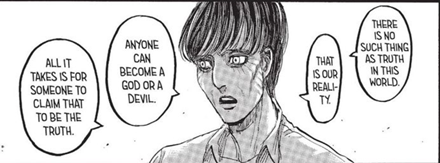Manga Review: The Humanity in Attack on Titan (Part II)-History
II. History
“All history is contemporary history.” -Benedetto Croce
(I) Historical Interpretation
When it comes to the topic of what history is supposed to be, I always remember the first course I took in university, Introduction to History (史學導論). In fact, I forgot almost everything in this course. There is nonetheless an idea deeply influencing me until now, that there are numerous events and facts in the past, but only the chosen ones can be written in the history.
I am a person who does not like the smell of alcohol, but certainly this fact will not become a part of history. On the other hand, however, we all know that Winston Churchill is an alcoholic. What makes the difference between the character of me and Churchill? Well, I am nobody, while Churchill is the one who led British against Nazi Germany in World War II. Churchill is simply much more important than me, but to who?
History is written for people living at present. As a result, the importance of a person or an event is defined by them. That’s why Benedetto Croce, a 20th-century Italian philosopher, historian and politician, said that all history is contemporary history. Since those which we will call history are actually what is important to us living at present instead of some irrelevant events in the past. This also explains why my high-school history textbooks consist of mainly European history when they are actually printed “World History” on the covers.
However, what is important might not be the same for different people. Since official history textbooks are made by governments, what is written will be those considered important by the ruler. For example, we Taiwanese have to learn Japanese history when we were colonized by Japanese, and have to learn Chinese history when we were colonized by Chinese. Although the contents in textbooks are different, the purpose is the same. The rulers want us to be loyal to their countries. To be more accurate, the Japanese ruler wanted us to be Japanese, and the Chinese ruler wanted us to be Chinese.
We all know that Taiwanese have similar cultures with both Japanese and Chinese, but we are different people. By studying more history, it will thus become clear that the contents in the history textbooks are made for political purposes in favor of the rulers. From the ruler’s point of view, studying history itself is already a threat to their rule, so they will do anything to “solve” such threat.
That’s why Erwin’s father, as a history teacher who finds inconsistencies in the official history textbooks, is then killed by the government, told to Pixis by Erwin in Pain(痛み), chapter 55. The rulers will also control the media to control what kind of information can be spread around people, which is why Roy as the reporter can only report the story created by the government, complained by the rookie reporter Peaure that they are nothing more than the crown’s propaganda, in Trust(信頼), chapter 60.
People around the world don’t really know why history is important, and how serious its influence can be. A full and successful history education with a specific political purpose is nothing more than a gigantic brain-washing machine. For example, people who receive the contemporarily standard Chinese historical education will take for granted that Taiwan is a part of China. If you ask them the reason, they will simply answer that it has always been the case from the ancient times, but we all know that this is bullshit.
Reiner and Gabi who receive the Marleyan education of history as they grow up, are both deeply convinced that people on the Paradis Island are nothing more than some devils who wish to conquer the whole world but fail. They, after getting in touch with the “devils”, both realize that those who live on the island are just normal people like them. This, as a result, causes Reiner’s schizophrenia as he cannot stand the guilt of killing normal people anymore, in Open(開口), Ch. 46, and The World They Saw (彼らが見た世界), Ch. 77. He collapsed while facing Eren in Guilty Shadow (疾しき影), Ch. 99, and apologized to Jean for killing Marco in End’s Eve (終末の夜), Ch. 127. Gabi, on the other hand, expresses her deep regret for what she has done, in Sneak Attack (騙し討ち), Ch. 118 and End’s Eve (終末の夜), Ch. 127 while protecting Reiner from furious Jean.
“I keep having this dream, about that old man in the reclaimed land, hanging by the neck from a tree. I keep wondering why he would tell us that story before hanging himself…For some reason, I keep thinking, that the old man, he wanted someone to pass him judgement.” (By Bertolt Hoover in Guilty Shadow (疾しき影), Ch. 99)
I am impressed by the illustration of how Erwin’s father is killed, how Reiner and Gabi get brainwashed by the Marleyan history, and how they react after realizing the truth(if there is any). The author must be well aware that history can be in a sense created in favor of rulers. This depends on educations for humanity, which are not considered as important as natural science, at least in East Asia. It is rare and thus precious to find it in a manga.

(II) Imagined Communities
Imagined communities is a book written by Benedict Anderson in consideration of nationalism, in which he proposed an idea that any nation in a sense is a community socially constructed by people who imagine themselves to be a group with something they all share with each other. Whatever the “something” is, you will always find it arbitrary after seeking the details in history, and thus any nation is built by several coincidences insufficiently grounded.
History is always too complicated to understand, and the truth is always too harsh to believe. As a result, a nation always needs a straightforward legend with some heroes to justify its existence. That’s why every country has its own father of the nation, not only as a memorial to someone, but also as a tool to warrant why the country must be built, as it is much easier to deify only one person. This is not enough, though. More proofs are needed, and thus a complete story from the ancient times will be created in favor of the country.
In From One Hand to Another(手から手へ), Ch.97. Theo Magath, the general of the Marleyan military, told Willy Tybur, the head of the Tybur family, that the statue of the hero of Marley, Helos, is nothing but a hollow bronze statue. Willy’s speech, in Guilty Shadow (疾しき影), Ch. 99, shows what the created and the true stories are. On the other hand, when Grisha and his comrades are reading the historical documents sent by the owl, in That Day (あの日), Ch. 86, in which they interpret all of them in favor of the Eldian people without a doubt even if they cannot decipher the ancient words.

By imagining such history, it is easy to feel connected. We are the same people. We share the same history, culture, and language. We are a people, and we will cooperate with each other to fight against those who want to invade us. The enemies are so evil that we brave people have to eliminate all of them. It is acceptable to bring a massacre because what we do is for our own country, people, and our loved ones.
As we see, this emotion might be dangerous, but also a useful tool to mobilize a group of people voluntarily risking or even sacrificing their lives for you. In most cases, however, the fact happening in the past is far from what is written in history or what is believed by the people. The emotion is true, but what they are fighting for might be nothing more than a lie. For example, black people are considered those who have black skin, but in the American history we can see that it actually means non-white.[1] This is well illustrated in the disputes between the Marleyan Warriors and the survey corpse members who refuse to follow Eren, in End’s Eve (終末の夜), Ch. 127. After all, it can be concluded with Kruger’s quote.
“There is no such thing as truth in this world. That is our reality. Anyone can become a god or a devil. All it takes is for someone to claim that to be the truth.” (By Eren Kruger in The Attack Titan (進撃の巨人), Ch. 88)

[1] For example, people v. hall, Ozawa v. United States, United States v. Bhagat Singh Thind.
MangaReview: (AoT)Why Levi Does Not Save Erwin | by 哲學宅 Philosophy Otaku | Medium
MangaReview: (AoT) Sasha and the Only Innocence | by 哲學宅 Philosophy Otaku | Medium
MangaReview: (AoT) How to Love Yourself as Ymir Does | by 哲學宅 Philosophy Otaku | Apr, 2021 | Medium
